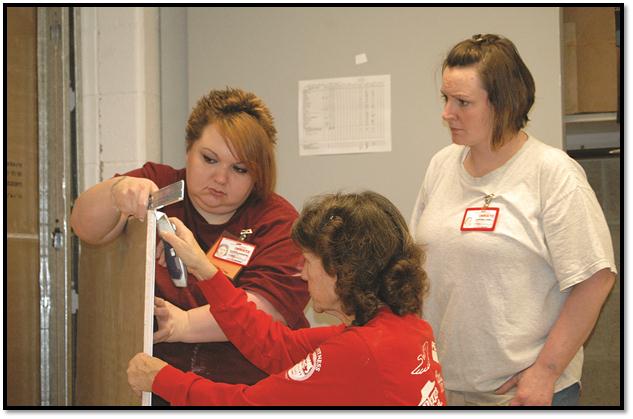University Communications and Marketing
MSU Billings work with female offenders viewed as statewide template
August 16, 2011
Contacts:
Kim Gillan, Workforce Development Program, 896-5878
Dan Carter, University Relations, 657-2269
MSU BILLINGS NEWS SERVICES — Work by Montana State University Billings to bring best practices in education and vocational training to female offenders in the Montana prison system is taking another step forward.
The university’s federally-funded “New Path, New Life” reentry initiative is being viewed as a template for use on a statewide basis.
State, federal and university representatives are meeting this week in Helena on strategic planning to develop a statewide reentry strategy for offenders, said Kim Gillan, the MSU Billings project manager for the local program.

The assistance was made available to Montana because MSU Billings was a recipient of Second Chance Act grant dollars. The university used the money to pilot the “New Path, New Life” reentry program in Billings with female offenders. Women were incarcerated in the Montana Women’s Prison or on the pre-release program at Passages. MSU Billings and the Department of Corrections have been partnering with the Montana Department of Labor and Industry on the Billings Area Reentry Task Force (BARTF) to assist with the jobs and education skills.
Gillan said while the focus of the program is on reducing recidivism through skills development, it also helps increase public safety and lower the cost of incarceration.
“We are working to transition female offenders from users of tax dollars to taxpayers,” she said. “This is a win-win for Montana, as when women are released, they have job skills, they are more likely to obtain and keep employment, support themselves and support, both financially and emotionally, their children.”
Because about 80 percent of people involved in the Montana corrections system are in community-based treatment facility, on probation or in a pre-release center, the specialized education and training makes sense, she said.
The MSU Billings project team includes, Gillan, Shaun Hoover, and Cindy Bell, along with 14 MSU Billings instructors from across the university.
Women who qualify for the program take courses in family economics, math, writing, reading, philosophy, carpentry, construction, small business planning, graphic design and concrete fundamentals. They also can get involved in programs that offer skills assessment and career planning. In order to graduate, inmates must complete 124 hours of coursework in the curriculum “core” of math, reading, personal work skills development and writing, and must complete at least two electives. MSU Billings faculty and community members are hired to teach the classes and serve as mentors. Since its inception, nearly 100 female offenders have participated in the program.
Also involved in this program are area employers, who have given guidance or shared their views on employer needs. Their input has been critical in designing the developmental education classes, special classes such as “Math for the Workplace.”
For more information on the Billings Area Reentry Task Force or the “New Path, New Life” initiative, contact Gillan at 896-5878.
PHOTO ABOVE: A representative from Habitat for Humanity works with two women at the Montana Women’s Prison during some hands-on construction training at the prison last fall. A program developed by MSU Billings and supported by local employers to provide women offenders with job skills and education is being viewed as a template for a statewide reentry initiative.
